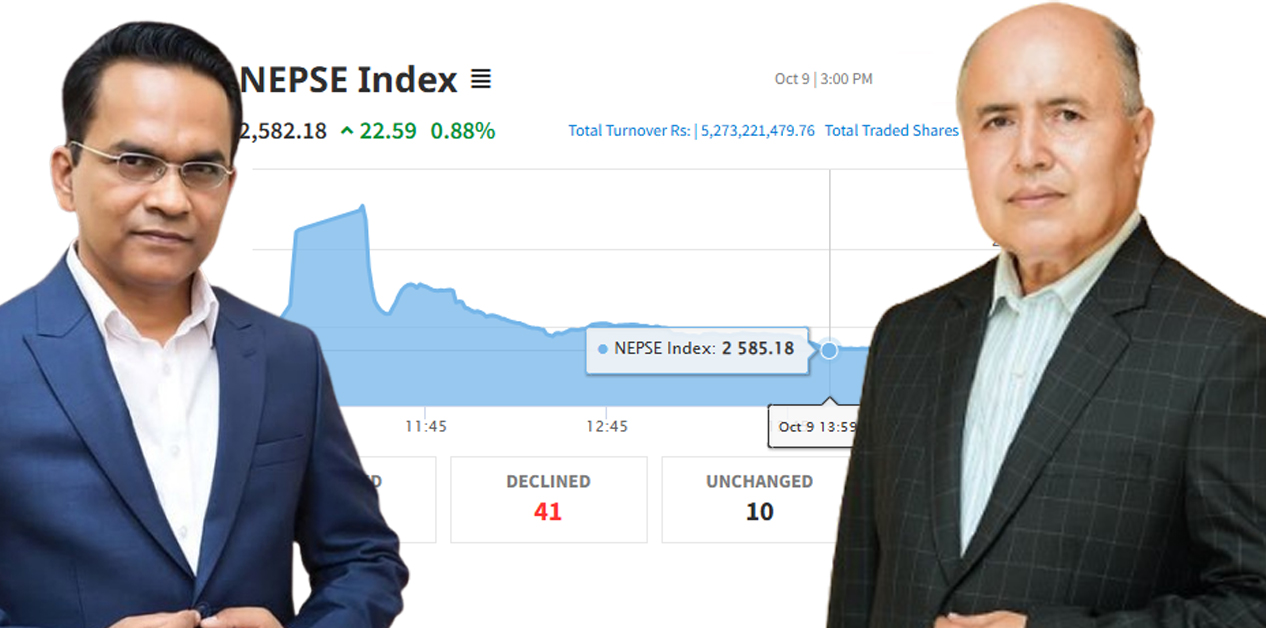

KATHMANDU: Despite the government’s earnest efforts to reform the capital market, investor confidence remains low.
Finance Minister Rameshore Khanal and Nepal Rastra Bank Governor Biswo Poudel have been working diligently to introduce capital market-friendly policies. However, their efforts have not been well-received by the market.
After the long Dashain holiday, the stock market reopened on October 7, but it has struggled to gain momentum.
The market was supposed to open on October 5, but due to heavy rainfall, the government extended the holiday by two days.
On the first day of reopening, the market saw a significant decline, with the NEPSE index dropping by 58.55 points.
The downward trend continued the next day, with a further decrease of 45.36 points, bringing the NEPSE index to 2,559.59.
On Thursday, the market showed a brief surge, with the NEPSE index rising by 102 points within just three minutes of opening.
However, this rally was short-lived, and by the end of the day, the NEPSE index had increased by only 22.59 points, closing at 2,582.18.
Prior to the Gen Z movement, the NEPSE index was near 2,700 points. On July 29, it reached 3,002 points, marking the highest level in four years. However, in recent days, the stock market has not shown significant improvement.
Former Finance Minister Bishnu Paudel had collaborated with former Finance Secretary (now Finance Minister) Rameshore Khanal to form a high-level economic reform commission. The commission submitted a report to the government with various recommendations for economic improvement.
Both Khanal and Paudel are proponents of an open market economy. They have been working together to reform the overall economy and the stock market.
Investors had hoped that their efforts would yield positive results in the stock market after the Dashain holiday. However, after observing the market for three days, it appears that their expectations may not be met.
Following the Gen Z movement on September 8 and 9, the current government came to power, leading to a surge in the stock market.
To reform the capital market, Finance Minister Khanal formed a Capital Market Reform Task Force on September 19.
The task force submitted its report on September 24, outlining immediate, medium-term, and long-term reforms.
One of the key recommendations was to remove the limit on share-backed loans.
Previously, the Nepal Rastra Bank had capped the amount of credit that could be extended against shares at Rs 250 million.
Based on the task force’s recommendation, the central bank has lifted this limit.
Additionally, the stringent regulations introduced by the central bank in 2021 to regulate the stock market have been removed.
The report also highlighted the need for reforms in the Securities Board of Nepal and the Nepal Stock Exchange.
These institutions have indicated that they are working on implementing the suggested reforms.
Despite the policy facilitation requested by investors, the market continues to be affected.
Former Chairman of the Nepal Securities Brokers Association, Bharat Ranabhat, states, “The stock market is a victim of political uncertainty. As long as the political direction remains unclear, the market will also remain uncertain.”
Indeed, Nepal’s stock market has been directly influenced by political events.
Decisions made by the government have impacted investors.
The interim government announced parliamentary elections for March 5 next year. However, it is still uncertain whether political parties will participate in the elections.
There are calls for the arrest of former Prime Minister KP Oli and former Home Minister Ramesh Lekhak for their alleged brutal crackdown during the Gen Z movement.
Major political parties have opposed these calls. There has been no direct dialogue between the government and the parties, leading to an unclear political landscape in the country.
Given the uncertainty about the future political environment, investors are hesitant, and this lack of confidence is reflected in the stock market.